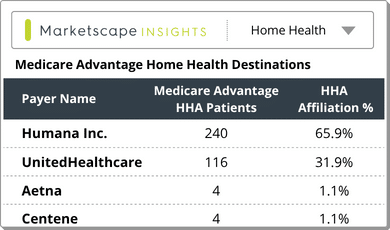BLOG
Increase Referrals with Data-Driven Conversations
By: Jessica Chew | January 31, 2020
Successful sales calls with referral sources highlight what differentiates your agency or facility and strongly correlate with metrics relevant to the account. By including data-driven insights that strengthen your case, you can more easily pique a provider’s interest, further productive conversations, and ultimately build new partnerships.
Here’s a quick game plan for your home health, hospice, or skilled nursing organization.
1. Gather your metric-based insights
Before you make your next sales call, understand your organization’s strengths and how they compare to competing providers in your area. Similarly, research each of your target referral sources to determine whether they’re the right fit, and if so, why.
Differentiate your organization on meaningful outcomes: After reviewing each account’s situation, determine the performance metrics that best highlight your expertise and track record. By demonstrating how you achieve the clinical outcomes they find most relevant, you’ll make a strong case for a relationship.
Get specific: The more precise the metric, the easier it is to make a meaningful connection. For example, if you’re talking to a hospital, it’s better to discuss readmission rates for a diagnostic category—referencing a particular patient population—rather than for total readmissions, which can feel harder to relate to.
2. Create compelling narratives
To capture and keep prospects’ attention, focus on just one or two key messages.
Use data to provide context and support your claims, and explain why your data points matter using personalized examples that resonate with the account. (Be sure to cite your sources so they won’t have to search for them.) Imagery can make complex information easier to understand and be more memorable than words alone. A mixture of charts, graphs, and other visuals, along with personal storytelling, makes for a powerful combination.
3. Position yourself as a trusted partner
Showing referral sources how you can help them improve can be tricky, as it may suggest they’ve been “doing it all wrong.” Instead, demonstrate you understand their challenges and position yourself as a collaborative problem solver. Based on your past successes and competitive insights, quantify how your expertise can help them improve outcomes and reduce cost.
4. Schedule actionable next steps
The best next steps will depend on the type of account and how you can assist them. What’s important is to move the relationship forward by agreeing to and scheduling a follow-up action before you leave the meeting. Be sure your organization is ready to take that action—and set a date for any deliverables such as sharing clinical data or conducting an account review.














